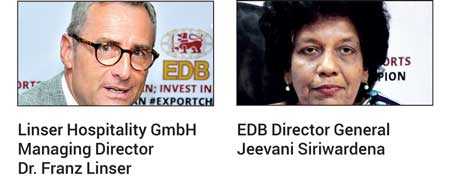Monday Feb 16, 2026
Monday Feb 16, 2026
Tuesday, 8 October 2019 00:00 - - {{hitsCtrl.values.hits}}
By Charumini de Silva
Wellness tourism in Sri Lanka will be boosted by a ground-breaking strategic action plan by the Export Development Board (EDB), which has partnered Australia’s Market Development Facility (MDF) for support.
The broader international brand development comprises four phases spread over a 12-month span. It will include a rapid assessment of the potential wellness tourism industry in Sri Lanka, product development, brand evaluation and development as well as marketing strategy.
As the first step in the brand development initiative, the MDF is supporting the EDB with an investment of Rs. 9 million to procure the services of Austrian wellness consulting firm Linser Hospitality GMBH, to conduct the first phase of the initiative, Rapid Assessment of the Potential Wellness Tourism Industry in Sri Lanka.
Renowned wellness tourism expert and lead consultant Linser Hospitality GmbH Managing Director Dr. Franz Linser is currently in Sri Lanka until 12 October to meet industry stakeholders and carry out a supply survey through field work.
The objective of the project is to provide an overview and analysis of Sri Lanka’s wellness tourism capacity and define its unique selling propositions (USPs) by the end of November. Based on the analysis, the assessment will provide key recommendations for a short-, medium- and long-term strategy to maintain and secure new markets to position the country as an attractive destination for wellness tourists.
“Wellness tourism is one of the key focused sectors in the National Export Strategy (NES). We want the wellness tourism sector also to contribute profoundly in achieving the $ 23 billion export target by next year,” EDB Director General Jeevani Siriwardena told journalists.
The EDB added wellness tourism to the export basket from last year and according to official statistical estimation, Sri Lanka earned $ 193 million from the sector in 2018. The UK, Austria, Germany, Switzerland and Australia have been recognised as initial focused markets to promote wellness tourism.
Dr. Linser said Sri Lanka’s Ayurveda was an incredible asset that could be developed into a strong national brand for wellness tourism.
“People no longer complain about flying long hours to fix their lifestyle problems such as being overworked, anxious and stressed. However, it has to be worthwhile arriving at that particular destination. We want to design a strategy where people want to come and benefit from this incredible asset that Sri Lanka has in Ayurveda,” he said.
Noting that there was a dearth of effective wellness tourism products in most parts of the world, Dr. Linser highlighted that Sri Lanka was blessed with a centuries-old treasure trove of indigenous knowledge, environmental assets and cultural heritage.
“Being close to healing surroundings is a growing notion and people from around the world are looking at places to enjoy this bliss away from their busy schedules on a minimum 10-day visit to fix their lifestyle problems. Sri Lanka has abundant natural assets such as highlands, lowlands, beaches and rainforests that allow people to be closer to nature,” he added.
During his week’s visit to Sri Lanka, Dr. Linser will collect as much as data as possible and compile a final report by the end of next month to find out Sri Lanka’s position as a global wellness tourism destination.
“We have to customise the products for new market groups and make Sri Lanka a destination that is worthwhile coming to for wellness tourism,” he said
Parallel to brand development and promotional activities, Siriwardena said the Wellness Tourism Advisory Committee (WTAC) in collaboration with the Sri Lanka Tourism Development Authority (SLTDA), Sri Lanka Tourism Promotion Bureau (SLTPB) and EDB will further strengthen institutional capacity and improve sector coordination.
“This initiative will focus on looking at long-term tangible benefits for the industry, which will also include quality jobs in the tourism sector through a fresh product range. We also hope to attract high-end tourists from new markets who will help boost our revenue generated from the sector,” she added.
Representatives from the wellness tourism industry commended the EDB’s effort to connect the stakeholders to the outside world and for recognising it as an export sector.
A year into implementation, the demand-driven Wellness Tourism Strategy, steered by its public-private platform, is actively priming Sri Lanka to capitalise on the $ 4.2 trillion global wellness industry by 2019.
Pix by Lasantha Kumara